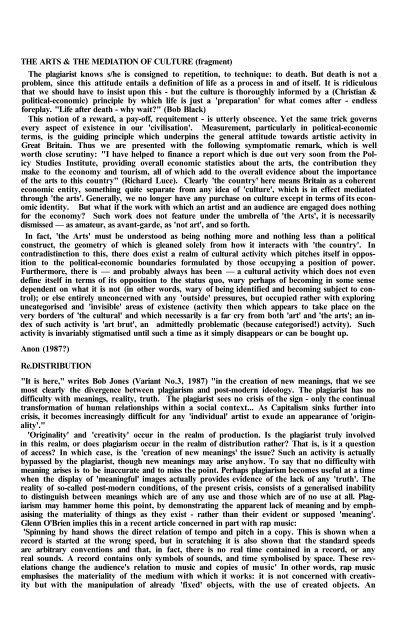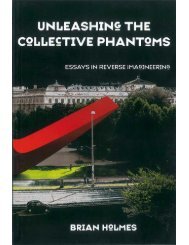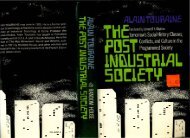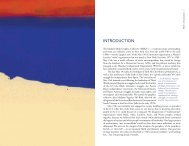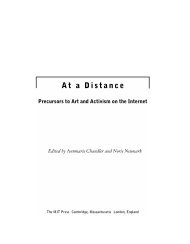Plagiarism: Art As Commodity and Strategies for ... - El plagio literario
Plagiarism: Art As Commodity and Strategies for ... - El plagio literario
Plagiarism: Art As Commodity and Strategies for ... - El plagio literario
Create successful ePaper yourself
Turn your PDF publications into a flip-book with our unique Google optimized e-Paper software.
THE ARTS & THE MEDIATION OF CULTURE (fragment)<br />
The plagiarist knows s/he is consigned to repetition, to technique: to death. But death is not a<br />
problem, since this attitude entails a definition of life as a process in <strong>and</strong> of itself. It is ridiculous<br />
that we should have to insist upon this - but the culture is thoroughly in<strong>for</strong>med by a (Christian &<br />
political-economic) principle by which life is just a 'preparation' <strong>for</strong> what comes after - endless<br />
<strong>for</strong>eplay. "Life after death - why wait?" (Bob Black)<br />
This notion of a reward, a pay-off, requitement - is utterly obscence. Yet the same trick governs<br />
every aspect of existence in our 'civilisation'. Measurement, particularly in political-economic<br />
terms, is the guiding principle which underpins the general attitude towards artistic activity in<br />
Great Britain. Thus we are presented with the following symptomatic remark, which is well<br />
worth close scrutiny: "I have helped to finance a report which is due out very soon from the Policy<br />
Studies Institute, providing overall economic statistics about the arts, the contribution they<br />
make to the economy <strong>and</strong> tourism, all of which add to the overall evidence about the importance<br />
of the arts to this country" (Richard Luce). Clearly 'the country' here means Britain as a coherent<br />
economic entity, something quite separate from any idea of 'culture', which is in effect mediated<br />
through 'the arts'. Generally, we no longer have any purchase on culture except in terms of its economic<br />
identity. But what if the work with which an artist <strong>and</strong> an audience are engaged does nothing<br />
<strong>for</strong> the economy? Such work does not feature under the umbrella of 'the <strong>Art</strong>s', it is necessarily<br />
dismissed — as amateur, as avant-garde, as 'not art', <strong>and</strong> so <strong>for</strong>th.<br />
In fact, 'the <strong>Art</strong>s' must be understood as being nothing more <strong>and</strong> nothing less than a political<br />
construct, the geometry of which is gleaned solely from how it interacts with 'the country'. In<br />
contradistinction to this, there does exist a realm of cultural activity which pitches itself in opposition<br />
to the political-economic boundaries <strong>for</strong>mulated by those occupying a position of power.<br />
Furthermore, there is — <strong>and</strong> probably always has been — a cultural activity which does not even<br />
define itself in terms of its opposition to the status quo, wary perhaps of becoming in some sense<br />
dependent on what it is not (in other words, wary of being identified <strong>and</strong> becoming subject to control);<br />
or else entirely unconcerned with any 'outside' pressures, but occupied rather with exploring<br />
uncategorised <strong>and</strong> 'invisible' areas of existence (activity then which appears to take place on the<br />
very borders of 'the cultural' <strong>and</strong> which necessarily is a far cry from both 'art' <strong>and</strong> 'the arts'; an index<br />
of such activity is 'art brut', an admittedly problematic (because categorised!) actvity). Such<br />
activity is invariably stigmatised until such a time as it simply disappears or can be bought up.<br />
Anon (1987?)<br />
Re.DISTRIBUTION<br />
"It is here," writes Bob Jones (Variant No.3, 1987) "in the creation of new meanings, that we see<br />
most clearly the divergence between plagiarism <strong>and</strong> post-modern ideology. The plagiarist has no<br />
difficulty with meanings, reality, truth. The plagiarist sees no crisis of the sign - only the continual<br />
trans<strong>for</strong>mation of human relationships within a social context... <strong>As</strong> Capitalism sinks further into<br />
crisis, it becomes increasingly difficult <strong>for</strong> any 'individual' artist to exude an appearance of 'originality'."<br />
'Originality' <strong>and</strong> 'creativity' occur in the realm of production. Is the plagiarist truly involved<br />
in this realm, or does plagiarism occur in the realm of distribution rather? That is, is it a question<br />
of access? In which case, is the 'creation of new meanings' the issue? Such an activity is actually<br />
bypassed by the plagiarist, though new meanings may arise anyhow. To say that no difficulty with<br />
meaning arises is to be inaccurate <strong>and</strong> to miss the point. Perhaps plagiarism becomes useful at a time<br />
when the display of 'meaningful' images actually provides evidence of the lack of any 'truth'. The<br />
reality of so-called post-modern conditions, of the present crisis, consists of a generalised inability<br />
to distinguish between meanings which are of any use <strong>and</strong> those which are of no use at all. <strong>Plagiarism</strong><br />
may hammer home this point, by demonstrating the apparent lack of meaning <strong>and</strong> by emphasising<br />
the materiality of things as they exist - rather than their evident or supposed 'meaning'.<br />
Glenn O'Brien implies this in a recent article concerned in part with rap music:<br />
'Spinning by h<strong>and</strong> shows the direct relation of tempo <strong>and</strong> pitch in a copy. This is shown when a<br />
record is started at the wrong speed, but in scratching it is also shown that the st<strong>and</strong>ard speeds<br />
are arbitrary conventions <strong>and</strong> that, in fact, there is no real time contained in a record, or any<br />
real sounds. A record contains only symbols of sounds, <strong>and</strong> time symbolised by space. These revelations<br />
change the audience's relation to music <strong>and</strong> copies of music' In other words, rap music<br />
emphasises the materiality of the medium with which it works: it is not concerned with creativity<br />
but with the manipulation of already 'fixed' objects, with the use of created objects. An


